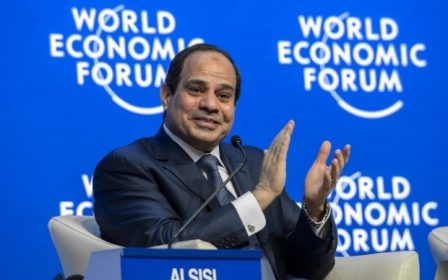Erdogan calls for unity among Muslim states as leaders gather in Istanbul

Turkish President Recep Tayyip Erdogan has called on Muslim states to unite in fighting terrorism and overcoming sectarian divisions in an opening speech at the annual summit meeting of the Organisation of Islamic Cooperation (OIC) in Istanbul.
"I believe the greatest challenge we need to surmount is sectarianism. My religion is not that of Sunnis, of Shias. My religion is Islam," Erdogan said in his opening speech.
“Why are we waiting for help from outside to solve our problems and put a stop to terror?” Erdogan said.
“Sectarianism is the biggest source of danger facing the Muslim world. We must unite to solve these problem ourselves,” he said.
Erdogan also suggested that other nations' intervening in the region were motivated "not for peace, but for oil".
In an op-ed piece for CNN published ahead of the summit, Erdogan said the Islamic world was being "crushed under the weight of one of the most serious challenges since World War I" and said that "armed conflicts, civil wars, failed states and outdated political structures" were depriving many Muslim countries of peace and stability.
"All this is being compounded - in Syria and elsewhere - through military intervention and the support of illegitimate governments by foreign nations with little or no knowledge of the region's history, values and sociology," he wrote.
Erdogan also called for reform of the United Nations, suggesting that the lack of a Muslim permanent member of the Security Council was unfair.
Turkey will take over the organisation’s chair for the next two years during the summit, which is being held under the theme of “Unity and Solidarity for Justice and Peace”.
Ankara has said it wants to use the meeting to narrow differences between the world's estimated 1.7 billion Muslims, but the gathering risks being overshadowed by disputes on issues ranging from Syria to Yemen, and tensions between Saudi Arabia and Iran.
Turkey's own policies in the Middle East have been controversial, with several Muslim states objecting to its support for Islamic-rooted opposition groups in Syria.
The OIC gathering is also expected to discuss the situation in Palestine, Iraq and Azerbaijan, where fighting recently erupted in the Armenian-held enclave of Nagorno-Karabakh.
Algeria and Turkey are also expected to submit a motion calling against intervention in Libya and a ban on supplying weapons to the country's armed groups, Anadolu reported.
Thirty heads of state and government from Muslim-majority nations are attending the annual meeting, which has been held since 1967 with the aim of overcoming differences in the Muslim world.
Key guests at the meeting include Saudi King Salman and Iranian President Hassan Rouhani, whose countries are locked on opposing sides in the Syria and Yemen conflicts.
In his address, Iranian President Hassan Rouhani warned against any message that "fuels division in the Islamic Ummah coming out of the Organisation of Islamic Cooperation".
According to the Iranian Press TV network, Rouhani's remarks came amid reports that Saudi Arabia is attempting to include statements against Iran and Lebanon’s Hezbollah movement in any draft declaration that arises from the summit.
There is a security lockdown around the summit venue in Istanbul, considered a symbolic host city because of its former status as the capital of the Ottoman Empire, whose rulers were considered the caliphs of Islam.
While the summit marks one of the most significant gatherings of heads of state for years in Istanbul, some high profile leaders, including Jordan's King Abdullah and Egyptian President Abdel Fattah al-Sisi, will be notable by their absence.
Turkey's relations with Cairo have still not recovered from the 2013 coup that removed the country's democratically-elected president Mohamed Morsi, the Muslim Brotherhood leader who was supported by Turkey, while ties with Jordan are being tested by differences over Syria.
Turkish Foreign Minister Mevlut Cavusoglu said the summit was being held at a time when "the Islamic world is experiencing many disputes within itself".
"Fratricidal conflict causes great pain. Sectarianism divides the ummah," he told OIC foreign ministers on Tuesday, using the Arabic world for the Muslim community.
"Hopefully, this summit will pave the way for healing some wounds."
Red carpet for Salman
The run-up to the summit saw a landmark visit by King Salman to the capital Ankara, marking a dramatic improvement in ties between Turkey and Saudi Arabia since he came to the throne in 2015.
Erdogan went to the airport to personally welcome the Saudi monarch on the tarmac and then gave him Turkey's highest honour for a foreign leader.
Dozens of black luxury cars were waiting on the tarmac to whisk the king and his delegation to a luxury hotel by the Bosphorus.
Saudi Arabia and Turkey both believe the removal of President Bashar al-Assad is the key to solving the Syrian conflict and back rebel groups fighting his government.
But analysts have warned that Turkey needs to tread carefully in its alliance with Saudi Arabia, which is also overwhelmingly Sunni Muslim, so it is not seen as a sectarian alliance aimed at Shia-majority Iran, with whom Riyadh is locked in a diplomatic struggle for influence in the Gulf region.
Stay informed with MEE's newsletters
Sign up to get the latest alerts, insights and analysis, starting with Turkey Unpacked
Middle East Eye delivers independent and unrivalled coverage and analysis of the Middle East, North Africa and beyond. To learn more about republishing this content and the associated fees, please fill out this form. More about MEE can be found here.




